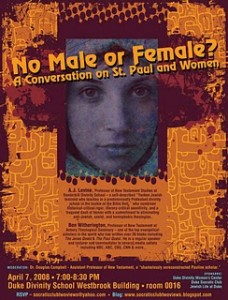Recently, Alexis, a teenager in my church asked me this question. I thought it might be a question that others are thinking about too. So here’s Alexis’ question and my answer.
Hey Pastor Tom,
So lately I have been looking into the whole idea of women not being pastors. I have read both sides of the argument, and am still forming my own opinions about the matter, but I was wondering what you thought about it? I know it is something [some local churches] are against, women being pastors, but that doesn’t mean a woman can’t be part of the church in large part. Mark Driscoll looks at it the same way. I also read things from numerous pastors that disagreed with the idea of women not being pastors.
Hey Alexis,
Awesome question. You’ve always got such great questions. I love them. Keep thinking and asking questions, even hard ones to answer.
I’ve got a short answer and a long answer. The short answer is that there is disagreement in the body of Christ about this issue, but I think that women should certainly be pastors if God calls them to be a pastor. The longer answer is explaining why I believe this. Here’s some of the reasons I believe that women can certainly be pastors.
 Examples in the Bible
Examples in the Bible
There are several examples of women being church leaders and teachers of men in the Bible. Take Priscilla and Aquilla, traveling evangelists/pastors. Interestingly the woman is listed before the man rather the other way around. This husband/wife team come across Apollos who is preaching incorrectly and Luke tells us that “When Priscilla and Aquila heard him, they took him aside and explained the Way of God to him more accurately” (Acts 18:26, NRSV). Then there’s Junia. Paul says, “Greet Andronicus and Junia, my relatives who were in prison with me; they are prominent among the apostles, and they were in Christ before I was” (Romans 16:7, NRSV). Notice that Paul says they were both prominent among the apostles. It is likely that they were both apostles. That’s a woman apostle! Then there’s Mary Magdalene, Mary the mother of James, and Salome. Mark tells us that when they came to visit Jesus’ tomb, it was empty and an angel says to them, “But go, tell his disciples and Peter that he is going ahead of you to Galilee; there you will see him, just as he told you” (Mark 16:7, NRSV). The angel tells these three women to go and tell the good news to the men. They are sometimes referred to as the “apostles to the apostles” (“apostle” means “one who is sent”). I could go on and on, but these three examples give you a taste of women being leaders/pastors/teachers in the Bible.
God’s Original Plan for Men and Women
God’s original plan in Genesis for men and women was one of equality. Eve was called a “helper” for Adam. “Helper” doesn’t mean that she’s of a lower rank than Adam. How do we know this? Because God is often called “helper” too! Is God lower than the one God is helping? No way. So what about what God tells Eve when she eats the apple? God says, “Your desire shall be for your husband, and he shall rule over you” (Genesis 3:16, NRSV). This is usually called “The Curse” and that’s exactly what it is. It’s not a commandment about how things ought to be, but it’s a curse in the sense that it describes how things are now messed up. Consider the “curse” that Adam gets: “Cursed is the ground because of you; in toil you shall eat of it all the days of your life” (Genesis 3:17, NRSV). Somehow those who think that women should serve their husband because of the curse don’t seem to have any problem with men using farm tools to make their curse of “toil” in the ground any easier. God intended for men and women to be equal. Our sin has caused a hierarchy. We’re not redeemed by Jesus to live into this hierarchy but to reclaim what we were created for: equality.
Counter Examples in the Bible
Of course for every example I bring up in the Bible will be met with some counter examples. Let’s take just one: “Women should be silent in the churches. For they are not permitted to speak, but should be subordinate, as the law also says” (1 Corinthians 14:34, NRSV). The question here as always is: Is this command of Paul’s specific to the church and the culture he’s talking to or should it be taken generally for everyone? I tend to think verses like this are more about respect and education and are specific to the situation Paul was originally talking to. I was teaching a group of teenage guys one time. There were three guys in the back who just kept chatting the whole time I was talking. It drove me crazy. I felt like shouting out, “And teenage boys shall remain silent while I am teaching! They are not permitted to speak, but should be subordinate because the Bible says teenagers should respect their elders!” Now if I said that, would I mean that all teenage guys in every place and in every time should remain silent and subordinate always? No! What I meant was that the guys I was talking to should be respectful and so should everyone else.
Modern Examples
There are a lot of different ways to approach the Bible. I approach the Bible through what is often called the “Wesleyan Quadrilateral.” That’s a big word but it simply means a set of four tools that John Wesley used to help us discern God’s will. The first and most important is the Bible, but the Bible always has to be interpreted. Anyone who tells you they just believe what the Bible says isn’t being fully honest with either you or themselves. We all bring interpretation to the Bible. The other three tools for interpreting are history (what have Christians said over the years), reason (what is the logical conclusion of our interpretations), and experience (what Christians have experienced throughout both history and our current world). While history has not always been kind to women pastors, there are several examples of women preaching and teaching throughout history. Reason is what I’m doing in this entire answer. Then there’s experience. Perhaps the most important example of experience you and I are both familiar with is Barb Flory. She planted this entire church! She had amazing gifts that God used to be the pastor of this church. God used her gifts in amazing ways to bring many people to know Jesus and follow him. When all four of these line up, there’s a pretty good chance that we know what God wants.
More Resources
Just in case I haven’t given you enough to chew on, here’s some other stuff that might be helpful:
 Christians for Biblical Equality website (especially check out their free articles page!).
Christians for Biblical Equality website (especially check out their free articles page!).- Duke Socratic Club’s No Male or Female event audio download – This is a “debate” group I was part of at Duke. We had Ben Witherington and Amy Jill Levine come and “debate” this issue, but it wasn’t much of debate because they ended up agreeing! There’s some other stuff on this website you might like. It is all kinda academic, but Alexis, I think you’ve got a kind of academic mind!
- Slaves, Women and Homosexuals by William Webb – This book is more advanced reading, but in it Webb puts together a proposal for understanding what in the Bible should be understood as applicable to all people in all times (“transcultural”) and what should be understood to be just for a specific people and time (“cultural”).
Alexis, I wonder if part of your question isn’t about searching a bit for your own call. What is God calling you to do and be? You’re right that if you or any woman is called to be a pastor, some churches won’t recognize or accept that call, but our church isn’t one of them. I thank God for that because if it was any other way, we wouldn’t even be a church!

YAY! Yes, women can be pastors… we can also be youth pastors (contrary to stereotypes!) 🙂 Thanks for this clear explanation Tom! Let’s raise up a new generation of empowered women! 🙂